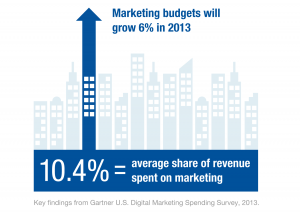 While 28% of companies have reduced their traditional advertising budgets and reallocated that money to digital marketing efforts, 20% have chosen to integrate traditional and digital marketing budgets and activities instead. 41% of companies are reinvesting the money saved by shifting to less expensive digital marketing activities are reallocating savings back into additional digital marketing efforts.
While 28% of companies have reduced their traditional advertising budgets and reallocated that money to digital marketing efforts, 20% have chosen to integrate traditional and digital marketing budgets and activities instead. 41% of companies are reinvesting the money saved by shifting to less expensive digital marketing activities are reallocating savings back into additional digital marketing efforts.
Those statistics come from the 2013 Digital Marketing Spending Report from Gartner which is based on a survey of over 200 marketers in six industries from companies based in the United States with over $500 million in annual revenue.
In 2013, the Gartner report reveals that 10.4% of revenue is spent on marketing, and marketing budgets will grow by 6% in 2013. Currently, the top three keys to marketing success for 40% of survey respondents are a corporate website, social media marketing, and digital advertising. The full breakdown follows:
- Design, development and maintenance of the corporate website = 45%
- Marketing on social network like Facebook, LinkedIn and Twitter = 43%
- Digital or online advertising = 43%
- Content creation and management = 35%
- Commerce experiences (marketing-led) = 27%
- Search marketing (including paid search) = 26%
- Email marketing = 24%
- Mobile marketing = 24%
- Analytics = 24%
- Company blog = 6%
The top priority initiatives for survey respondents in 2013 are:
- Commerce experiences
- Social marketing
- Content creation and management
- Mobile marketing
Digital marketing has become so important that 70% of companies surveyed in the Gartner study revealed that they have a Chief Marketing Technologist on staff with 80% of them reporting to the marketing department rather than the IT department. This person’s role is critical in managing digital marketing initiatives with a focus on the technology that powers their success.
Despite the increased focus on digital marketing, 50% of companies that participated in the Gartner study outsource some or all of their digital marketing activities. The percentage of companies that outsource digital marketing activities is shown below, which you can use to compare to the list above that shows how important companies think each of these initiatives is to marketing success:
- Search marketing (including paid search): 50%
- Digital or online advertising = 46%
- Mobile marketing = 45%
- Email marketing = 37%
- Content creation and management = 36%
- Analytics = 36%
- Design, development and maintenance of the corporate website = 35%
- Marketing on social networks like Facebook, LinkedIn, Twitter, etc. = 34%
- Commerce experiences (marketing-led) = 34%
- Company blog = 27%
I’m very surprised to see mobile marketing rank so low in the list of marketing success factors. I also think search marketing and the company blog should be higher priorities for companies. One thing that’s not surprising is the low ranking of analytics as a success factor. With 70% of respondents claiming to have a Chief Marketing Technologist on staff, this ranking should be much higher. The company that learns to truly leverage their data will have a significant advantage over competitors.
What do you think about these survey results? Any surprises for you? Leave a comment and share your thoughts.
Image: Gartner
Susan Gunelius is the author of 10 marketing, social media, branding, copywriting, and technology books, and she is President & CEO of KeySplash Creative, Inc., a marketing communications company. She also owns Women on Business, an award-wining blog for business women. She is a featured columnist for Entrepreneur.com and Forbes.com, and her marketing-related articles have appeared on websites such as MSNBC.com, BusinessWeek.com, TodayShow.com, and more.
She has over 20 years of experience in the marketing field having spent the first decade of her career directing marketing programs for some of the largest companies in the world, including divisions of AT&T and HSBC. Today, her clients include large and small companies around the world and household brands like Citigroup, Cox Communications, Intuit, and more. Susan is frequently interviewed about marketing and branding by television, radio, print, and online media organizations, and she speaks about these topics at events around the world. You can connect with her on Twitter, Facebook, LinkedIn, or Google+.


